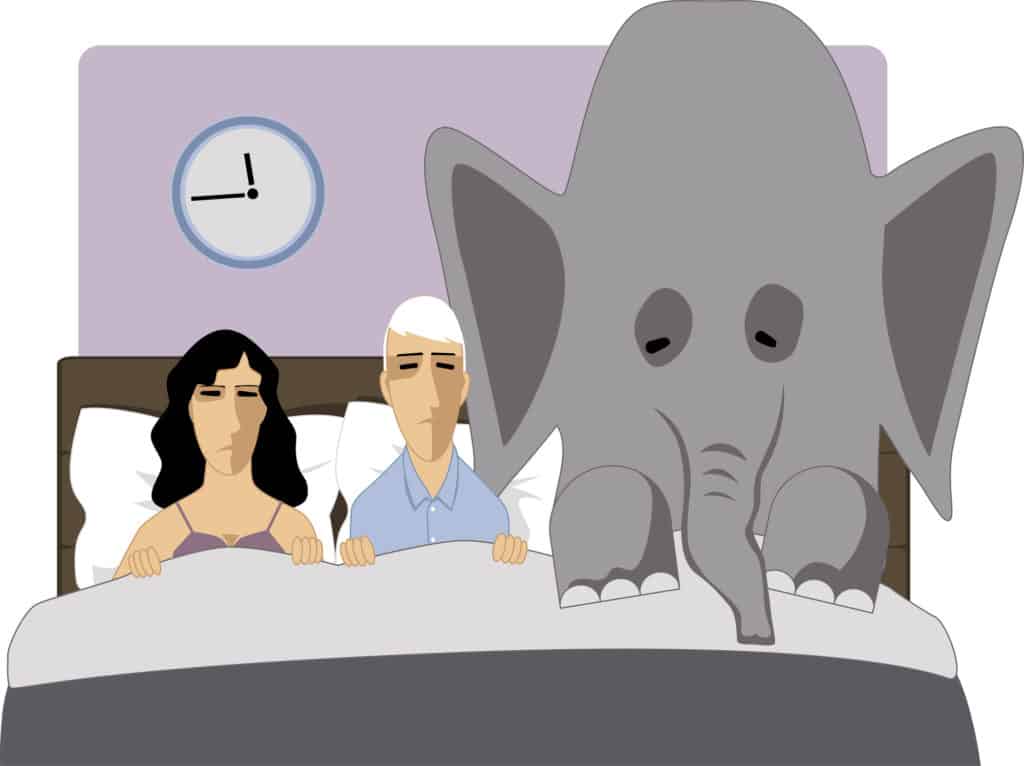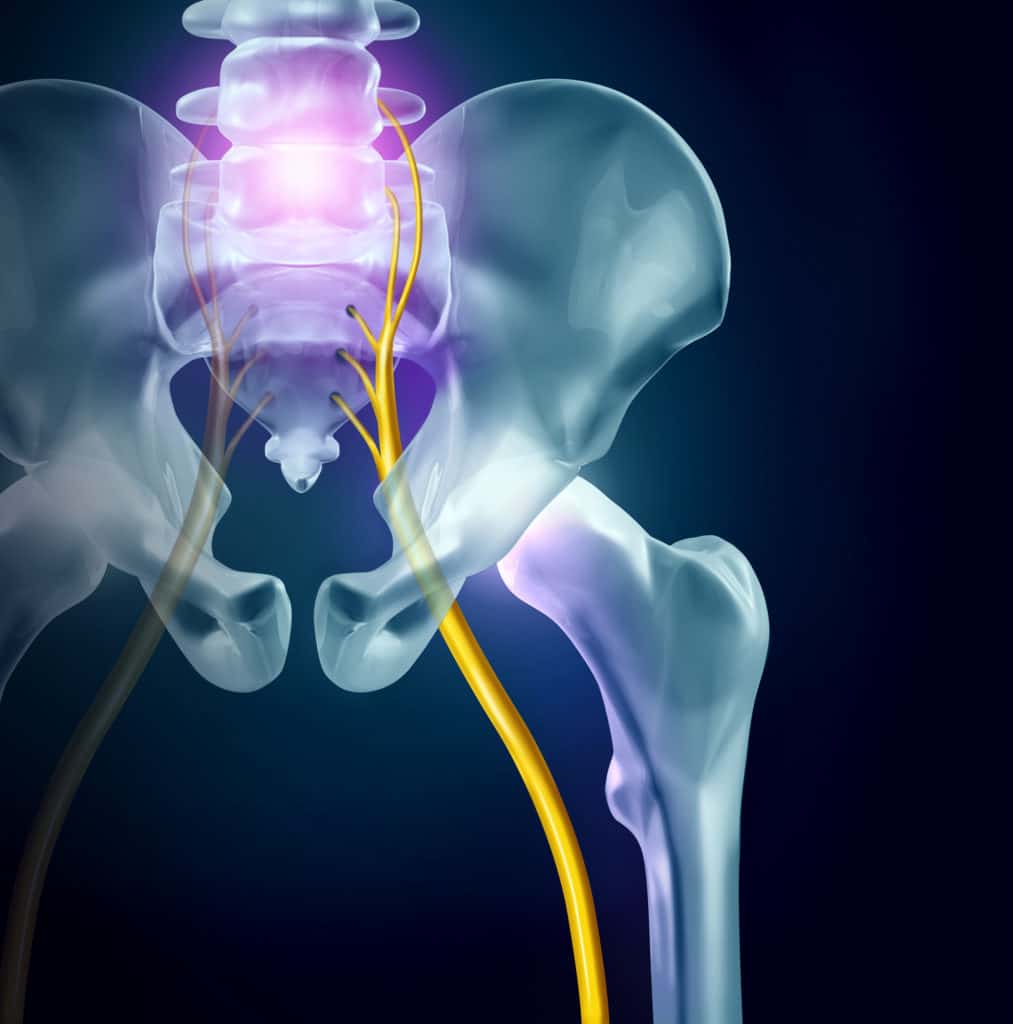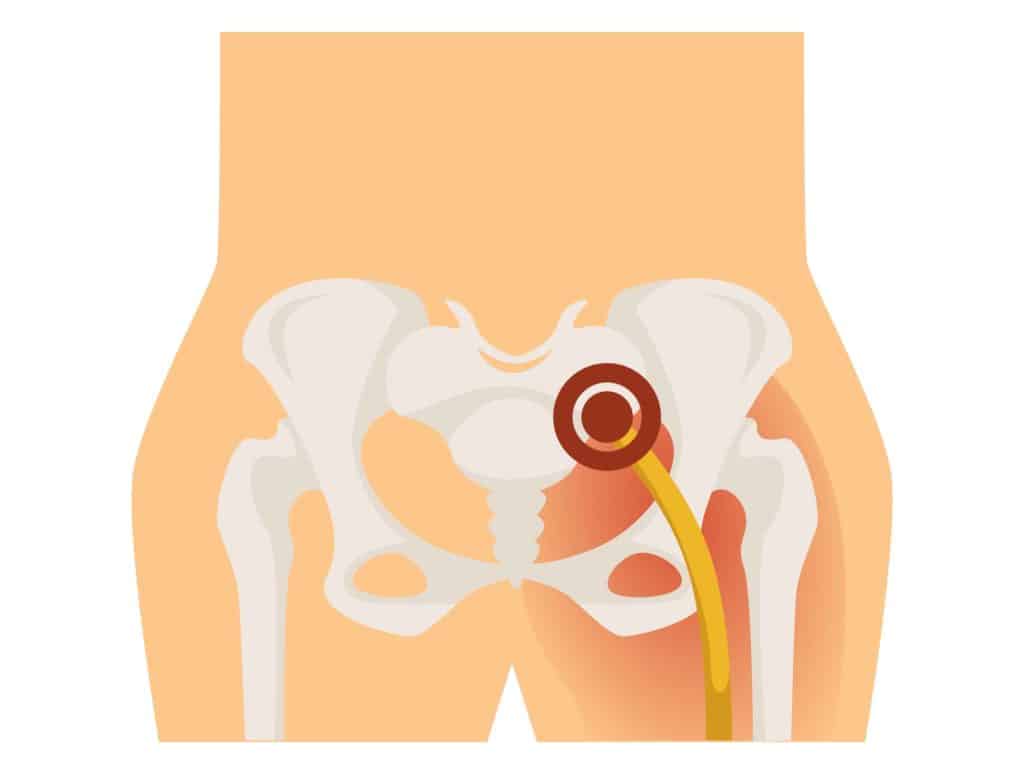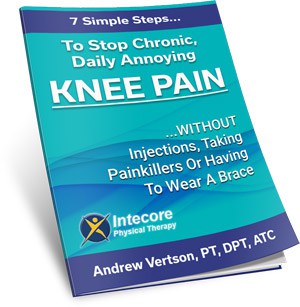
If you’ve enjoyed a healthy sex life up until this point, but you or your partner suddenly have erectile dysfunction, a pinched sciatic nerve could well be the culprit.
Luckily though, the chances are (if it is related to the sciatic nerve) you can breathe a big sigh of relief. It isn’t forever because Physical Therapy can usually restore proper function by finding and treating the root cause.
Impotence and the inability to get or maintain an erection can have a massive impact on men’s mental health. It can affect your self-esteem and the quality of your relationships. It can trigger episodes of anxiety and depression, so it’s essential to seek help and not suffer in silence.
According to The American Journal of Medicine:
“erectile dysfunction affects over 18 million men in the US or 18.4% of the male population aged 20 years or older”.
So, it’s not something you should be embarrassed or ashamed about. There are many different causes of erectile dysfunction too. For one man, it could be diabetes or high cholesterol. In contrast, for another, it could be smoking or a sleep disorder. More surprisingly, however, some men experience not getting or maintaining an erection due to a problem relating to the sciatic nerve.
But what is the sciatic nerve, and what does it have to do with male sexual function?
The Sciatic Nerve

The sciatic nerve is the largest in your body. For lots of people, it’s the most troublesome nerve in the body too. Sometimes causing intense pain, mobility problems, muscle weakness, and various other associated issues that are so severe that desperate patients opt for opioid medication, dangerous spinal surgery, or nerve block injections because the pain is so debilitating.
There is a sciatic nerve on both sides of the body – running into each of your legs, but problems are usually one-sided. This bothersome nerve runs from your lower back -branching out from your spinal column through the pelvis and the center of your butt muscle, down into your lower leg. It would be unlucky – and mostly unheard of to have problems with both at the same time. It’s usually just one.
The main reason we see a large number of problems associated with the sciatic nerve is not just because it’s a large nerve but also because it serves so many vital functions. It’s a two-way feedback system interpreting and sending signals to and from the brain that travel down the spinal column and control movement and feeling for pretty much everything below the waist. (That probably gives you a clue as to why it can be involved in erectile dysfunction).
But more specifically, you can think of the sciatic nerve(s) as a messaging system that initiates movement in your muscles and feeds sensory information back to the brain. Without the sciatic nerves, you really wouldn’t be able “to put one foot in front of the other.”
So, now we know what purpose the nerve(s) serve in the body. Let’s get back down to business and answer the all-important question; Why would a problem with this nerve cause you or your partner to experience erection problems?
Well, before it’s a problem, it seems easy to get an erection, right?
For most couples, full penetrative sex is an integral part of their intimate life. But there is a lot more going on underneath the hood than you would imagine. Just feeling aroused isn’t enough. You need nerve activity and blood flow, and the straightforward attraction to rise to the occasion fully.

There are only so many times you can use other forms of stimulation before one or both partners become bored and unfulfilled. It’s a problem that probably needs fixing sooner rather than later. Plus, it’s essential in all cases of erectile dysfunction to find the root cause. We need to rule out more serious cardiovascular issues and other health conditions contributing to the problem.
If any of the nerves, veins, or arteries that supply blood and control the sensory and motor function to the penis are not functioning correctly, your penis will remain flaccid, and your partner bitterly disappointed – no matter how hard you try or how aroused you may feel internally.
We’ll leave the potential issues with blood flow for another blog. But specifically in the case of nerves, a “pinched nerve” can happen anywhere in the body (there are 7 trillion of them inside the human body). Sometimes referred to as radiculopathy, pinched nerves occur from overuse or as a result of degenerative diseases like arthritis and other medical conditions such as cancer or diabetes or following an injury.
In more simple terms, it refers to one or more of your nerves getting “squashed,” constricted – or in some cases stretched past its usual range.
Inside the body, nerves are responsible for sending and receiving messages between different parts of your body and the control center at the top: your brain. They tell your brain to activate bodily systems and perform various functions.
Like the immune system or the central nervous system – the former sending lymphocytes to fight infection and the latter speeding up the heart rate in response to stress (so you can run away from that Tiger).
There are two main branches of nerves wired up to the penis: the cavernous nerves and the pudendal nerves, each with its own associated nerves and sensory receptors. A problem with any of these nerves can cause erectile dysfunction. Still, it’s a problem further up the chain in the case of a pinched sciatic nerve – probably where the sizeable sciatic nerve runs through the pelvis.

When the sciatic nerve is pinched or compressed – which we commonly call Sciatica, messages to and from your brain cannot reach the penis. So even though you feel excited, that message doesn’t reach your penis, and sadly you’re unable to get or maintain an erection long enough for penetrative sex. You’re left red-faced and embarrassed, and your partner is confused and hurt – wondering why they can’t arouse you properly.
Sciatica usually presents with the following symptoms:
Radiating pain in the lower back, buttock, and leg – with pain usually felt most acutely down your leg. Nerve pain is typically moderate to severe – with patients reporting a “burning” or “stabbing” type of pain that is different from the regular dull ache of joint pain. You may also feel muscle weakness, numbness, or tingling in the same areas.
Pain is worse when you move around.
In severe cases, a reduction in bowel and bladder control.
How To Treat A Pinched Sciatic Nerve

If a sciatic nerve is the cause of your erectile dysfunction, we can reassure you that full function will return. You’ll be able to get back to a full and satisfying sex life soon when we resolve the problem with your sciatic nerve.
But how do you fix a Pinched Sciatic Nerve?
We’d love to say that you can fix this problem at home. But aside from nerves being extremely delicate. The most crucial part of treatment for this type of erectile dysfunction is to find the root cause. There are so many different reasons why your sciatic nerve may have become pinched. You need a professional who has treated Sciatica before to identify what’s going on quickly.
Sometimes it does get better on its own when acute swelling or inflammation in the area goes away. As the nerve heals, you should start to see a marked improvement in your sexual function. But if things don’t improve and you’ve had pain for any longer than one week, we recommend you contact your doctor or Physical Therapist as soon as possible.
Sciatica, pinched nerves, and the associated root cause can usually be diagnosed from a physical exam – and treated at the Physical Therapy office. But in severe cases, you may also need an X-Ray, EMG (electromyography), CT, or MRI scan. This scan is so we can get a more in-depth picture of what’s causing your pinched nerve.
Unfortunately, in really severe cases, you may need surgery to correct the problem and relieve the pain. But that’s why it’s essential to consult with a Physical Therapist as soon as you notice a problem. If you put it off and the problem goes untreated, you may be forced to undergo dangerous spinal surgery as a last resort to fix the pain.
At Intecore Physical Therapy, we treat pinched sciatic nerves and other types of radiculopathies every day. If you’d like to chat to one of our Physical Therapists, in confidence, for some advice on whether or not you do, have a pinched sciatic nerve. We offer all new patients a free 30-minute telephone consultation or, if you prefer, an in-person appointment at the clinic.
There’s no obligation to book treatment after the call either.
The sooner you seek help, the sooner we can get things working again.
Please don’t put it off any longer. Book your free appointment here now – and don’t panic about the delicate subject matter. We are here to help, we are not here to judge.
Like this article? Here are a few more by Intecore you might be interested in
Knee Kinesiography with KneeKG
Managing Joint Pain Postpartum: 7 Tips for New Moms
- How To Sleep with Sciatica and Back Pain - February 12, 2026
- Postpartum Joint Pain? 7 Fast Relief Tips for Busy New Moms. - February 3, 2026
- Sciatica or Piriformis Syndrome? 3 Ways to Tell the Difference (Self-Test Guide) - December 22, 2025











